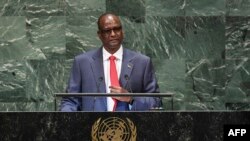The U.S. government has imposed sanctions on South Sudan’s First Vice President Taban Deng Gai, accusing him of serious human rights abuses and trying to derail the country’s peace process.
In a statement Wednesday, the Treasury Department’s Office of Foreign Assets Control (OFAC) said Deng has worked to divide and sow distrust in the Sudan People’s Liberation Movement in Opposition (SPLM-IO), the rival group to President Salva Kiir’s party. It says his actions have extended the conflict in South Sudan and hurt peace and reconciliation efforts after a five-year civil war.
It says he also reportedly arranged and directed the killings of human rights lawyer Samuel Dong Luak and SPLM-IO member Aggrey Idry, in an effort to solidify his position in Kiir’s government and to intimidate members of the SPLM-IO.
“Taban Deng Gai’s attempt to silence the opposition party is derailing the country’s ability to implement a peace agreement,” Deputy Secretary Justin Muzinich said in the statement. “The United States calls on all nations to exclude from the international financial system those who jeopardize South Sudan’s future.”
Last month, the Treasury imposed sanctions on five other South Sudanese officials also thought to be involved in the disappearance and deaths of Dong and Aggrey.
In September 2018, Kiir and opposition leader Riek Machar signed a revitalized peace agreement that called for the formation of a national unity government by May 2019. Government and opposition leaders extended that deadline twice, but have not taken steps to create a unified national army — one of the measures seen as key to implementing the peace deal.
Hundreds of thousands of South Sudanese were killed during the civil war, and hundreds more have died in sporadic clashes around the country since the peace deal,
which included a permanent cease-fire.
“The Government of South Sudan’s refusal to create political space for dissenting voices — from opposition parties, ethnic groups, civil society, or media — has been a key factor in the country’s inability to implement a peace agreement and ongoing acts of violence against civilians,” said the Treasury statement.
US Sanctions South Sudan's Vice President Over Abuses
update





